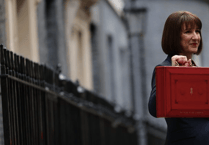Last week, this Editorial space contained words of warning that the financial picture being painted by the Welsh Government is indeed dire, and it has a £900m hole in its finances.
Now, sadly, it would be remiss of this publication in this space this week not to comment on the stark warning contained in a report from the BBC’s Shared Data Unit on council finances.
And the news is again bad.
Local authorities in Wales are facing a black hole in their finances — and unless funding is found, service cuts and higher council taxes are coming. It’s as simple as that.
The Welsh Local Government Association is warning that the situation is not sustainable.
All of the councils that serve the people of this region are cash-strapped from one extent to another.
Powys, for example, is predicting a £14.7m deficit. In Gwynedd, where the council has planned savings of £5.2m, there is uncertainty over the future of its finances.
Perhaps not surprisingly for those who live within Ceredigion, the county council failed to answer questions asked by the Beeb. It has, however, previously stated earlier this year that it has a £10m hole.
Last year, Ceredigion taxpayers were hit with the third-highest tax increase in Wales — some 7.3 per cent, and it says it is facing difficult choices to again balance its books this year.
Every taxpayer in this region should be bracing for the inevitable hits and cuts that are in the pipeline.
For those who own second homes, the dire financial outlook means that councils should be using their full new taxing powers to maximise revenues.
For those dependent on services provided by our local authorities, the outlook is equally bleak.
And for those who look at our councils and question their use of our taxes, there needs to be far closer scrutiny of how they spend — or waste — our money.
If Cardiff Bay is intent on downloading its financial woes onto local councils, it should also allow them to generate other revenue streams
Slapping a levy on every caravan in Wales would be a good start.
Everyone will have to share the pain.




